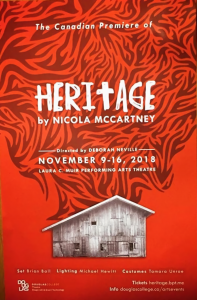
‘Heritage’ play review
By Naomi Ambrose, Staff Writer
4/5
Heritage is a sombre yet lighthearted reminder about the complexities that emerge when immigration, female empowerment, gender, and identity are intertwined with social class, family turmoil, love, hopes, and dreams.
The Canadian premiere of Nicola McCartney’s Heritage was held at the Laura C. Muir Performing Arts Theatre at Douglas College from November 9 to 16, with a cast comprised of Douglas Theatre students and alumni.
With hopes and dreams as wide as the Saskatchewan plains, Sarah McCrea—the protagonist of the play—is a feisty young Irish woman who immigrated to Saskatchewan with her family in 1914. Sarah’s hopes and dreams are also evident in her personality. Her character is an unusual mix of childlike innocence sprinkled with a bold, tough girl attitude.
While Sarah recounts her experiences, her memories, and her interactions with Michael Donaghue (her male neighbour who becomes a lot more than just that), she mostly smiles and speaks with enthusiasm. However, her girlish innocence is quickly replaced with boldness as her relationship with Michael deepens. Sarah’s character and personality is a refreshing and revolutionary representation of a strong woman in that time period, challenging narratives from the early twentieth century that often portray women with subservient characteristics.
The reimagined stereotypical female is also evident with Ruth McCrea, Sarah’s mother. Even though Ruth is generally soft-spoken with a quiet presence, Mrs. McCrea isn’t afraid to express her opinions to her husband. She’s especially vocal in moments where she feels that her husband Hugh McCrea is weak, stubborn, and unreasonably determined to stay in Saskatchewan—despite the economic hardships they encounter, their son fighting in the war, and the loss of their three-year-old daughter.
Then there is Emer Donaghue, Michael’s frail yet outspoken grandmother. Emer is not afraid to chastise her son Peter Donaghue about his libertarian parenting skills with Michael. Emer is also bold enough to walk to the McCrea’s house to interrupt dinner when Michael and his father are dining with Sarah’s family. Grandma Donaghue is willing to speak loudly and to set new rules to establish peace between Sarah’s family and her own.
Even though the characters of Sarah, Mrs. McCrea, and Emer Donaghue challenge the conventional literary and media representations of subservient women in history, other stereotypical representations are present throughout the play. One of these stereotypes is evident with Hugh, Sarah’s father and Mrs. McCrea’s husband. Christian Krushnel, Douglas College Theatre Program alumnus, portrays Hugh as a stereotypical burly, gruff, tough, loud, drunk, blunt, and abusive man to theatrical perfection.
Heritage is also a moving reminder that moments of levity can be good coping mechanisms to deal with economic hardships, personal trauma, or family turmoil. The lighthearted moments are evident in the playful father and daughter scene when Hugh climbs up a ladder in his barnyard and Sarah quickly climbs up the ladder to meet her father. They both wave their hands—presumably at all the people in the world whom they see from the top of the ladder.
In another fun scene, Michael teaches Sarah how to dance a traditional Irish dance. Sarah and Michael’s dance eventually becomes a key moment in the play when the white, bright stage light shines on them among the darkness of the rest of the stage—until the bright light fades.
Over time many of us change. As time passes, we experience the joys and sorrows of life, the effects and implications of change and immigration. Heritage gives a reflective, dramatic, and impactful representation of the dynamics of change in our lives.
